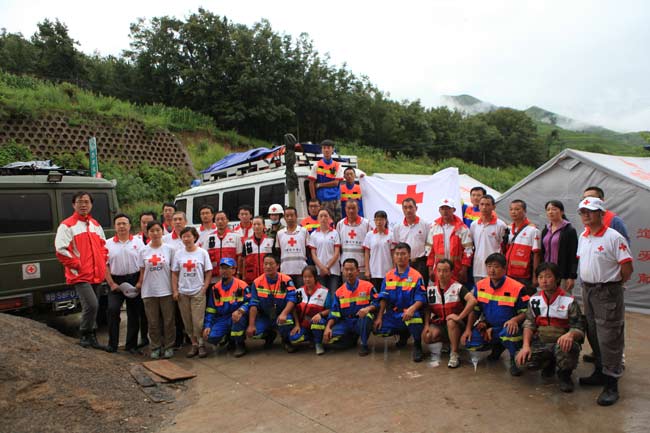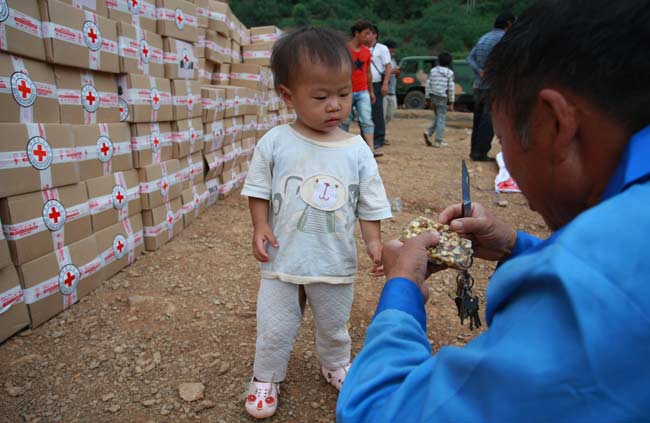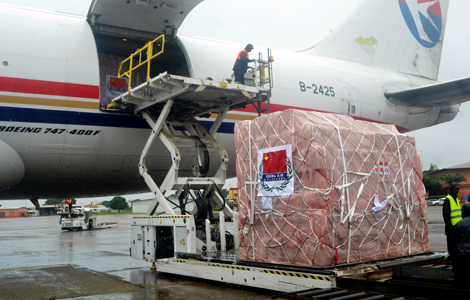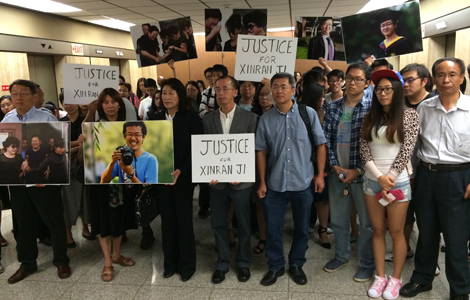Volunteers give vital quake support
Updated: 2014-08-14 07:34
By An Baijie (China Daily)
|
||||||||
|
 |
| Volunteers with the Red Cross Society of China at the quake zone on Aug 11. ZHOU QIANG / FOR CHINA DAILY |
As of Aug 6, about 70 domestic non-governmental organizations have dispatched rescue teams to the quake-hit zone in Ludian county, according to statistics released by the Ludian county commission of the Communist League of China.
|
Online donors rally An online donation drive to help victims of the magnitude-6.5 quake, which hit Ludian county in Yunnan province, collected more than 10 million yuan ($1.6 million) within a day. Leading online shopping platform Taobao.com launched the drive at about 6 am on Aug 4, about 14 hours after the quake struck. Taobao users could make donations through a link on the website, and cellphone users could donate funds to help rescue and relief operations through an app on their phones. To boost transparency, the website has publicized all of the donations. Donors can also track how the donations are being used. On Aug 4, Alibaba Group, which runs Taobao.com, announced that it would give 5 million yuan directly to the civil affairs department of Yunnan's provincial government. Many other large online shopping platforms have also donated to the quake-hit zone. JD.com donated a total of 5 million yuan of cash and assets, and Tencent Holdings Ltd donated 5 million yuan. As of 4:30 pm on Aug 5, a total of 15 foundations had collected more than 21.85 million yuan of donations through online platforms, according to a report by the Legal Mirror newspaper. - An Baijie |
Groups like the Water Safety Program of China also lobby for aid online to help equip disaster victims with basic water purifiers, according to the program's chief Chen Lisha.
Government-backed foundations fund some NGOs in the quake zone. The China Foundation for Poverty Alleviation has provided funds to Blue Sky to help cover its transportation, gasoline, and accommodations.
Zhang Yong said that China's civil rescue forces have certainly been more professional in rescue operations for the Ludian quake.
"The coordination between the government and NGOs has become smoother in dealing with natural disasters," he said, adding that a communication platform is important for distributing the large human resources at the quake zone.
To that effect, about 20 of the NGOs involved jointly established an online platform on Aug 4 to share information, report casualties and coordinate the work of the social rescue forces.
Through the platform, the NGOs have reached a consensus for professional rescuers to be given priority in accessing the quake zone, with all other volunteers asked to clear the way for them.
Hao Nan, leader of the Zhuoming Emergency Information Center, said that the goal of civil groups is to assist the government and help in areas where it cannot handle rescue work on its own.
Hao's NGO collects and verifies online information on both survivors and rescuers, before guiding rescuers via the popular WeChat and QQ chat platforms.
He said that if inexperienced volunteers enter the quake zone, they could hinder rescue work due to their lack of knowledge and expertise.
On Aug 4, Yunnan's civil affairs department also called on the volunteers not to swarm the quake zone as rescue vehicles had already blocked the crucial road accessing the area.
Individual efforts
Apart from professional rescue teams, many individual volunteers have also been active in the rescue work.
Adil Memettur, a young member of the Uygur ethnic group, arrived at the quake zone with 1,400 boxes of the traditional cake of his ethnic group after traveling 1,200 kilometers from Hunan province.
"The Xinjiang nut cake is nutritious and easily preserved. It is also Muslim food that suits the ethnic groups in Yunnan," he said, adding that his 5,000 kilograms of cake can feed 50,000 people for a day.
Adil, 24, who has just graduated from Changsha University of Science and Technology in Hunan, became a popular figure in the country for his online store selling the Xinjiang snack "qiegao," also called "marentang," a kind of dense nougat made from nuts, candied fruit and malt syrup.
Former soldier Cao Huibin, 52, joined the rescue operations with 14 other veterans on Aug 5.
"We did not come in the first two days because we knew that those were the 'golden 72 hours' when saving lives is the top priority," he said.
The veterans, aged from 52 to 60, were all from Kunming, Yunnan's provincial capital.
Cao said it was important for them to get registered first because that would help mark out their tasks more clearly.
"Even though we are not as young as the soldiers any more, we want to help out in any way in we can," he said.
Sun Shuopeng, who heads the medical and rescue team of the Red Cross Society of China, said that more individual volunteers understand that they are part of a network that complements the Chinese civil rescue teams which have become more rational and professional.
In the past, individuals would usually join some NGOs in flocking to disaster zones in a disorderly manner, Sun said.
"Earthquake rescue work is not as simple as digging out some bodies or helping several people out from the debris. They are part of a systemic network that requires NGOs and volunteers to enter the quake zone at a time when their expertise is really needed," he said.
Contact the writer at anbaijie@chinadaily.com.cn
|
 |
| An earthquake victim feeds his grandson the nut cake donated by Adil Memettur. ZHOU QIANG / FOR CHINA DAILY |

 Enter the dragon - the wax dragon
Enter the dragon - the wax dragon
 Ebola collaboration urged
Ebola collaboration urged
 Chinese rally at court for Ji
Chinese rally at court for Ji
 China's Napa Valley bid ripe for growth
China's Napa Valley bid ripe for growth
 Wanda's Hollywood premiere gets welcome
Wanda's Hollywood premiere gets welcome
 Sheriff official: Robin Williams killed himself
Sheriff official: Robin Williams killed himself
 Chinese warships visit US navy base after joint drill
Chinese warships visit US navy base after joint drill
 Unique panda triplets take a bow
Unique panda triplets take a bow
Most Viewed
Editor's Picks

|

|

|

|

|

|
Today's Top News
Brazil presidential candidate Campos killed in plane crash
US Marine deployment raises brows
China, global markets spur Priceline deal
More than 1,000 auto firms probed
Chinese fans mourn beloved star
Deng TV series lifts the lid on key years
Futures consultants see future in China
Menlo Park VC invests in China's medical tourism
US Weekly

|

|








